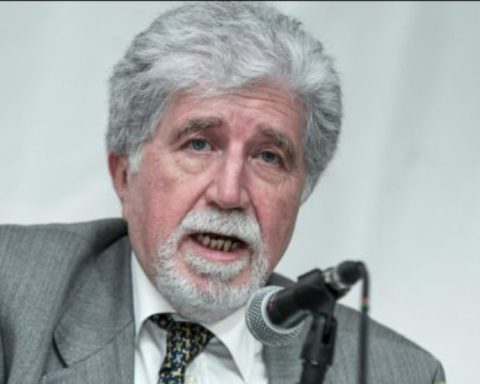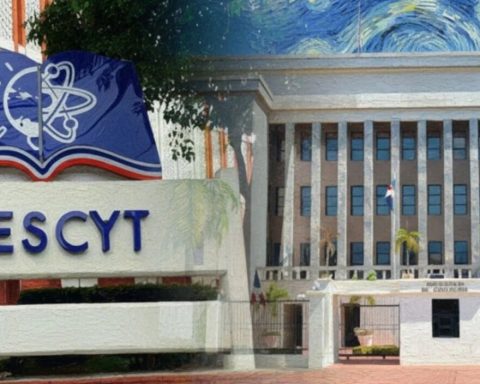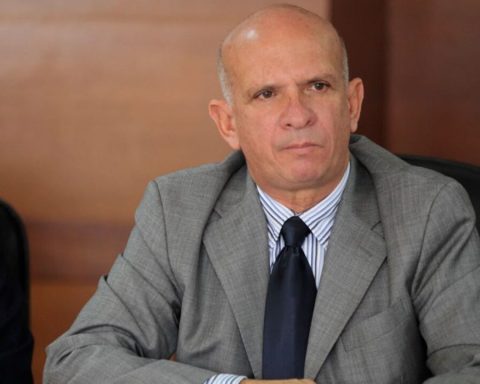The risk of not having a “basic political consensus” in the coalition or the importance of “calibrating” well unpleasant measures such as raising the retirement age were some of the warnings that three experts handled about the pension reform that the Executive Branch is studying and whose entry into Parliament is scheduled for the middle of this year , as confirmed in recent days by the President of the Republic Luis Lacalle Pou.
This Thursday, the National Association of AFAP of Uruguay (Anafap) organized a Panel Discussion on the Pension Reform based on the Recommendations of the Commission of Experts on Social Security.
It had the participation and contributions of Ariel Davrieux, former director of the Planning and Budget Office (OPP), Gonzalo Zunino, director of the Center for Economic Research (CINVE); and Carlos Matyszczyk, former general manager of República AFAP.
In their lectures, the guests gave their first impressions and shared analysis about the document recommendations for the reform of the pension system who presented the Commission of Experts on Social Security (CESS) to the Executive Power on November 12, 2021.
Leonardo Carreno
Rodolfo Saldain, president of the CESS
Some pending aspects
For Zunino, the social security reform should aim, first of all, at “contain spending is pensions” since that is the “most important challenge”. On the other hand, he argued that the reform could be used to have a “better intergenerational distribution of public social spending” since today “the most of it falls on the pension system whose amount is very high compared to education or health”.
“We spend a lot of money there. The reform could be used to have a more reasonable intergenerational balance of public social spending and it could also seek to solve these design problems by better targeting intragenerational heterogeneities in the implicit subsidy”, he explained.
Zunino argued that in the document you can see different parametric changes linked to the calculations of the basic retirement salary, changes in the replacement rate or increase in the minimum retirement age that they can generate “stir at the level of public discussion” so you have to “calibrate those measurements well”.

Camilo dos Santos
bps
However, he stated that they are measures “expected and understandable” after “solve the financial sustainability of the system”. “Unfortunately, the financial sustainability of the system is solved with measures that are not very nice but are understandable.”.
On the other hand, Zunino established some “outstanding aspects” in the CESS recommendations. On the one hand, he argued that the suggested transformations “should be much more supported by concrete estimates of the results that are expected to be achieved with the same”. In that sense, he marked the costs of joining the mixed system, global fiscal impacts, impacts on coverage and sufficiency, and distributional impacts.
The director of Cinve also stated that there are aspects that are established “with too many degrees of freedom“, what I could “difficulty the evaluation”, such as the bonus theme.
alternative proposals
Matyszczyk, for his part, showed his position regarding several chapters of the document presented by the CESS, among which, for example, the one referring to the accumulation stage of the mandatory individual savings regime.
At this point, the engineer referred to the manager’s electionwhere he said he shared the CESS recommendation regarding maintain the freedom of choice of members. He also appreciated the proposal of avoid competition focused on sales force as it has proven to bevery be very negative for the affiliate” in the countries where it was implemented.
Consider net return on default options is another of the points with which Matyszczyk He agreed but he added that this must happen “as long as it is not carried out at the beginning of the worker’s active life” given that “if it is done like this it harms it”.
The most innovative point pointed out by the former general manager of AFAP Republic within the chapter was the CESS recommendation to introduce competition in two stages and with a tender in the first.
This competition, according to the CESS, would have a first stage of bidding with three years of permanencesomething that Matyszczyk shared because “It goes in the direction of charging the affiliate very little at the beginning, which is when it is most interesting to charge little”. That first stage would, according to the CESS, a portfolio with short-term characteristicssomething to which Matyszczyk did not find “advantages”.

Camilo dos Santos
AFAP Republic
In the second stage it is given election of the administrator by the affiliates and those who do not choose are assigned by net return. “Here the care that must be taken is that the advantage that was achieved in the first stage with the tender, of eliminating the competition focused on the sales force, is not generated here because it is very likely that there will be competition focused on force. of sales”, warned the former general manager of AFAP Republic.
In what has to do with the forms of bidding, the recommendations of the CESS include two options, on the one hand, a single price for all memberssomething that is used in Chile and that Matyszczyk considered “has Proven to be very suitable for the entry of new competitors but not serve to lower the price for existing affiliates”.
The other option is allow different prices for new and existing affiliates. For Matyszczyk this “going in the right direction” since it enables affiliates “when they first enter pay little because that is what can mean more savings in the future”.
The former general manager of República AFAP proposed a “alternative way to work in two stages” which has as its purpose “maximize member savings” using the tools that are “minimal cost up front and minimize the likelihood of sales force-focused competition”. This would be done in two stages, the first in the first three years from the member’s entry and the second beginning in the fourth year.
In the first stage The new affiliates of each year would be distributed in equal parts for all the administrators. Later A Maximum Commission 1 would be applied to all these affiliates, which would be defined by the regulator as a value that only covers the operating cost of the administrators. Then the member I could change administrator whenever I want.

Camilo dos Santos
bps
In the second stage, the regulator would define a commission cap called Maximum Commission 2. Later, the administrators will communicate, at the end of year three, their commission for the entire fourth year and the affiliate will be able to choose. Those who don’t choose may be assigned by net return but, according to Matyszczyk, “not all to the one with the best net profitability”. “The one with the best net profitability takes the most, the second a little smaller, the third a little less and only the one with the worst net profitability does not take any affiliate”, he explained.
For Matyszczyk, The benefits of this alternative proposal are several. On the one hand, that the marginal cost of managing members’ savings for one year is almost zero since the new affiliates are less than 3% of the stock.
On the other hand, all administrators would charge something the first year, something that is not verified with the tender. What’s more, all administrators except one would receive affiliates in the second stage. It is also appreciated that this modality would not hinder the entry of new competitors and what is the most favorable situation for the member. To this is added, according to Matyszczyk, that the greater stability of the administrator’s income decreases the probability of focused competition in sales force.
Treatment in Parliament
Davrieux, with a more political look, valued the work of the CESS as “fantastic” and was asked about how the discussion of the reform should be approached in Parliament to try to reach a consensus. In this sense, he stated that “consensus is prior” and that must be achieved among the members of the government coalition. “It is enough that something like 10% or 15% of the deputies or senators do not vote for it to no longer work, so this consensus has to be basic and prior”, he alerted.
In turn, the former director of the OPP justified that the consensus must occur in the coalition given that “the opposition party and the social groups that participated have more or less the same mentality and did not vote or diagnose” so that “no support can be expected no matter how many modifications are made to the project”.

















